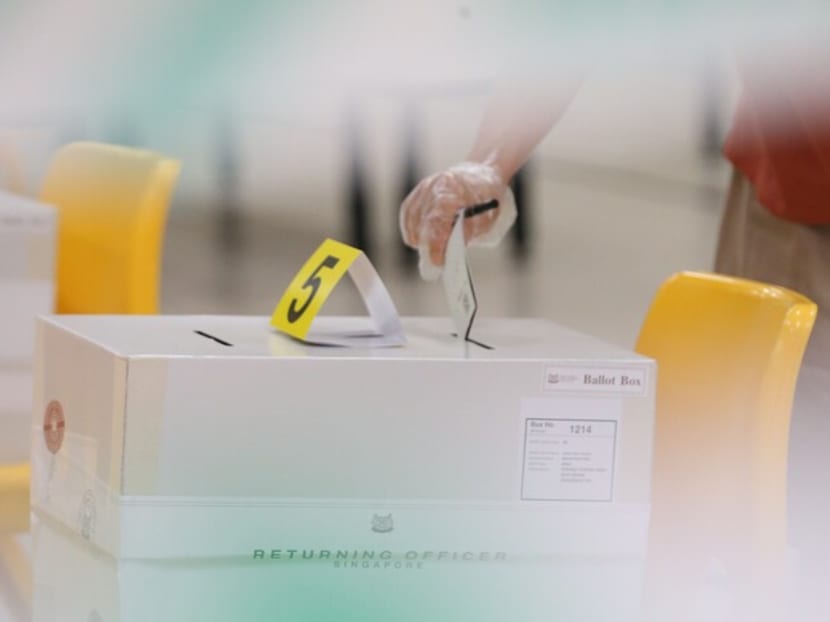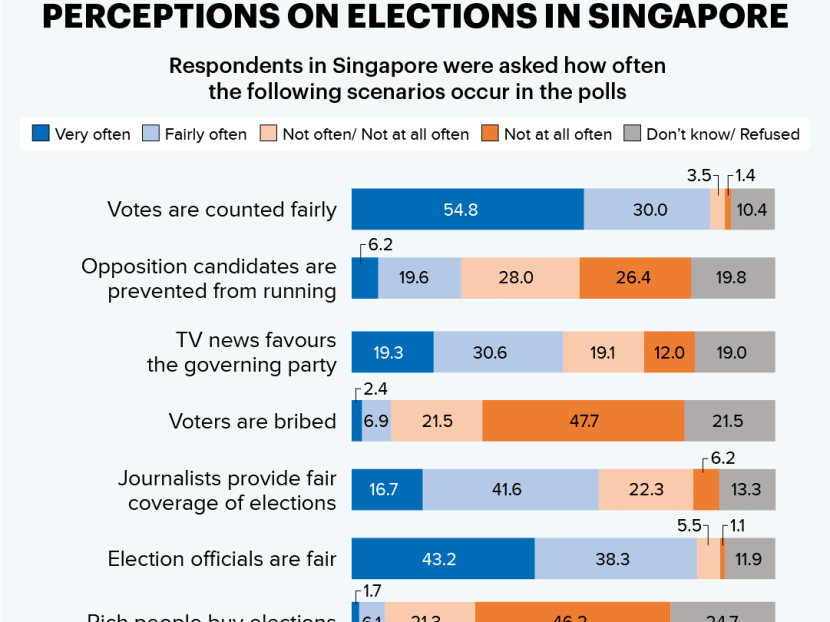Most S'poreans say elections are fair, offer ‘genuine choice’ but 1 in 4 feels opposition candidates ‘prevented from running’: IPS report
SINGAPORE — Most people in Singapore are likely to believe that national elections are fair, that they have some say in what the Government does, and that they are given a genuine choice in the polls, findings by the Institute of Policy Studies (IPS) showed.

A survey found that Singapore had the second-highest proportion of respondents who believe that genuine choices are offered to voters in elections, behind Taiwan.
- A 2020 global survey that polled more than 2,000 Singapore respondents was analysed by IPS
- It found that Singaporeans were among the most political apathetic and least politically active in the world
- Most people said they had some, though not much, power to effect changes on government decisions or on politics
- Most said elections are fair and viewed treatment of voters positively
- Despite political apathy, Singaporeans do take part politically by signing petitions, donating to groups
SINGAPORE — Most people in Singapore are likely to believe that national elections are fair, that they have some say in what the Government does, and that they are given a genuine choice in the polls, findings by the Institute of Policy Studies (IPS) showed.
However, more than one in four people felt that opposition members are “very or fairly often prevented from running” at elections, the study found. This was lower than in Malaysia, Taiwan and Hong Kong where the figure was over 50 per cent.
The IPS researchers, which released the analysis on Friday (July 2), also found that more than a third of Singaporeans have never spoken to friends about politics and more than half have done so only occasionally. This makes Singapore one of the more politically apathetic countries among the 80 or so countries polled in the cross-national World Values Survey.
This is similar to the findings in an IPS previous report arising from the 2020 global survey.
Despite such apathy, Singaporeans do participate politically, the study found. More than one-fifth had donated to a group or campaign and searched for information about politics, though a third thought that they had no say in what the Government does given the political system here.
The study is the third one from IPS to analyse the data from the global survey, which involved more than 2,000 respondents in Singapore and was conducted between November 2019 and November 2020. The latest report focused on the lived experiences of people here.
On politics, the team of four researchers led by Dr Mathew Mathews concluded that political apathy does not mean that Singaporeans’ lived experiences are devoid of political actions, as can be seen from the findings that political actions such as donations, contacting government officials or signing petitions were more popular than organised protests or political events.
“But while they do participate politically, respondents are nuanced in their choice of political action… Such responses are not surprising considering the strict laws that Singapore has with regards to collective mobilisation and gatherings,” the report concluded.
However, the researchers stressed that the respondents were generally unwilling to take part in these activities.
Those who said that they would take part in more outward forms of political action — boycotts, peaceful demonstrations, illegal strikes, or online political activities and protests — were likely to be higher-educated people, possibly due to their more critical knowledge of politics, they said.
“Given the protest movements overseas, including sustained ones in Hong Kong between 2019 and 2020, it will be interesting to examine whether better-educated and younger Singaporeans expect an updating of current restrictions for such political action.”

THE FINDINGS
Most respondents felt that they had some, though not much, power to effect changes on government decisions or on politics through Singapore’s political system, the study found.
When asked how much the political system allows them to have a say:
38.8 per cent of Singapore respondents said that they had “some” say and 24.3 per cent said that they had “very little”
18.8 per cent said that they had “a lot of” say in the Government’s decisions and 10.4 per cent said that they had “a great deal” of influence
Only 7.6 per cent said that they had no influence at all
The results were similar to those in Hong Kong and Taiwan. The study noted that in Malaysia and Japan, people there felt that they had a lot of influence in government decisions through their political systems.
Respondents here were also asked about how they perceived elections in Singapore, spanning topics such as the fairness of the elections, media coverage and the treatment of voters.
84.8 per cent of Singapore respondents felt that votes are counted fairly. Older and higher-educated people were most likely to believe this
81.5 per cent of respondents felt that election officials are fair
When it came to election news coverage, 30.6 per cent of respondents felt that TV news favours the governing party fairly often and 19.3 per cent said “very often”. This is similar to the proportion in other countries
There is a reasonable level of trust in journalism standards, with 16.7 per cent saying that journalists provide fair coverage of elections very often and 41.6 per cent saying that it happens fairly often
Very few (under 10 per cent) respondents felt that voters are bribed, that rich people buy elections or that voters are threatened with violence at the polls
In general, treatment of voters was viewed quite positively, the researchers noted
Most respondents felt that they had a genuine choice in the elections, the study found.
41.2 per cent of respondents said that they “very often” had a genuine choice and 34 per cent said “fairly often”. Respondents seemed quite happy with their electoral choices in general, the researchers noted
Singapore had the second-highest proportion of respondents who believe that genuine choices are offered to voters in elections, behind Taiwan. Female and older respondents were slightly more content with their electoral choices than male and younger respondents
There was a mixed reaction to the question about whether the Opposition was prevented from running, with 6.2 per cent saying that this happened very often and 19.6 per cent said that it happened fairly often. Just under one in five, or 19.8 per cent, either said that they did not know or refused to answer
Most were quite positive about the opportunities for women in office, with 49.7 per cent of respondents picking “very often” and 32.3 per cent selecting “fairly often”
On political activism, the study found that Singaporeans, in general, do not take part in any form of political action.
The most likely form of political action is to donate to a group or campaign. Around 54 per cent of Singapore residents have done or might do so, which is the lowest proportion compared with other countries
Around 48 per cent of respondents said that they have or might contact a government official as a form of political action. More-educated and wealthier respondents were more likely to do so
Around 44 per cent of respondents would or have signed a petition. This was higher than other Asian countries, with the exception of Japan
The study found a general aversion to encouraging others to act politically or to do so themselves. Singapore had the highest proportion of people who said that they would never join unofficial strikes, lawful or peaceful demonstrations, boycotts, or organise political activities and events
Analysing the data, the IPS researchers found that older and less-educated people who live in smaller housing types were less likely to take part in such political activities. In particular, those aged between 21 and 35 were more than six times more likely than those above 65 to carry out such political actions.
Among those who do, however, the study found that these more politically active individuals were more politically interested, had more autonomy in life and were less satisfied with the functioning of the political system.
They also had lower confidence in state institutions, had higher support for democracy and believed that citizens have a lot of political say, the study found.











